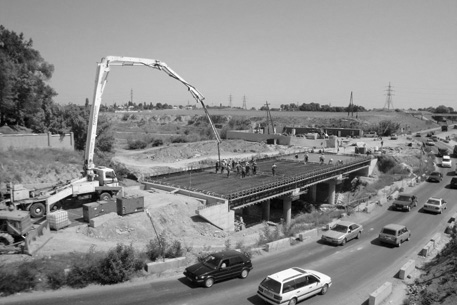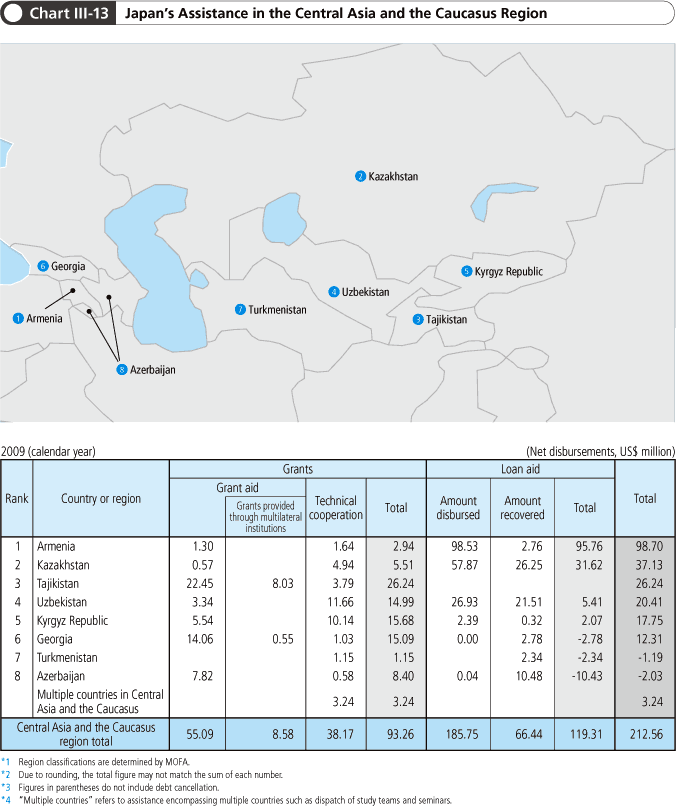Japan's Official Development Assistance White Paper 2010
3. Central Asia and the Caucasus
The Central Asia and the Caucasus regions are a geopolitically strategic area due to their proximity to Russia, China, South Asia, the Middle East, and Europe. The regions are also strategically important to Japan as they have a large abundance of natural resources including oil, natural gas, uranium, and rare metals. The stability and development of these regions have an impact on the Eurasian region as a whole, including Japan. From this perspective, Japan provides nation building support to each country in order to establish long-term stability and sustainable development in the regions, and in consideration of a broader regional perspective including regions that border Central Asian nations such as Afghanistan and Pakistan. This is done in the hope of helping to radiate basic values such as human rights, democracy, market economies, and the rule of law.
<Japan’s Efforts>
In order to facilitate the transition from a planned economy to a market economy and realize economic development, Japan has carried out a diverse range of assistance activities. For social sector reconstruction these include the improvement of legal institutions and health and medical care, developing infrastructure for shifting to a market-based economy and economic development, and the development of human resources for institution building. For example, Japan Centers for Human Development (”Japan Centers”) have been established in Uzbekistan, Kazakhstan, and Kyrgyz Republic as bases for human resource development assistance. At these centers, business courses and other activities are provided based on Japan’s experiences, through which they contribute to the cultivation of human resources that can accommodate the introduction of a market economy in the region. Also, dialogue and collaboration have been undertaken at various levels under the framework of the Central Asia plus Japan Dialogue, which was established in 2004 with the aim of promoting cooperation within the region.
There are many oil fields with world-class reserves on the coast of the Caspian Sea in Kazakhstan and Azerbaijan, in which Japanese enterprises partially own their interests. The oil being exported from these fields runs through pipelines passing through Central Asia and the Caucasus. Therefore, stability and economic development in this region are important for stabilizing the international energy market as well as for securing access to energy resources. Japan provides assistance to this region such as improving public services, cultivating human resources, and developing infrastructure, including power plants.

Construction work for the floor slab of the Alamedin bridge under construction (Kyrgyzstan) (Photo: JICA)

●The Project for the Capacity Building of Road Maintenance in the Kyrgyz Republic
The landlocked country of Kyrgyzstan depends on road traffic for 95% of its transport and means of transportation. However, 60% of the public roads managed by the Ministry of Transport and Communications are unpaved. Not even main roadways are in good condition, and maintenance of the road network is inadequate. This has an enormous impact on both economic development in Kyrgyzstan and the lives of its citizens. Therefore, Japan began dispatching experts in 2008 to perform technical transfers via seminars, the creation of manuals, pilot projects, and other such activities. Through this technical cooperation project, Japan aims to improve the skills of personnel at the Ministry of Transport and Communications and staff at road maintenance offices with regard to the improvement and maintenance of the road network. What is more, by combining this with grant aid projects for improving equipment — such as the Project for Improvement of the Equipment of Road Maintenance in Issyk-Kul and Chui Oblasts that has been carried out since FY2009 — the expectation is that this will improve the road network in Kyrgyzstan, and by extension vitalize the Kyrgyz economy and improve the lives of its residents.
